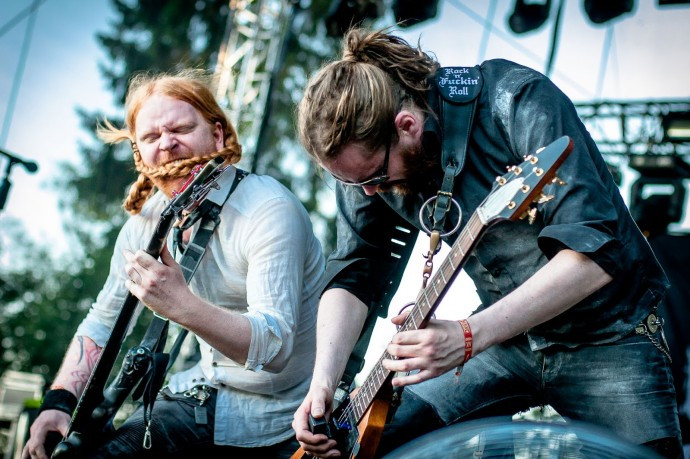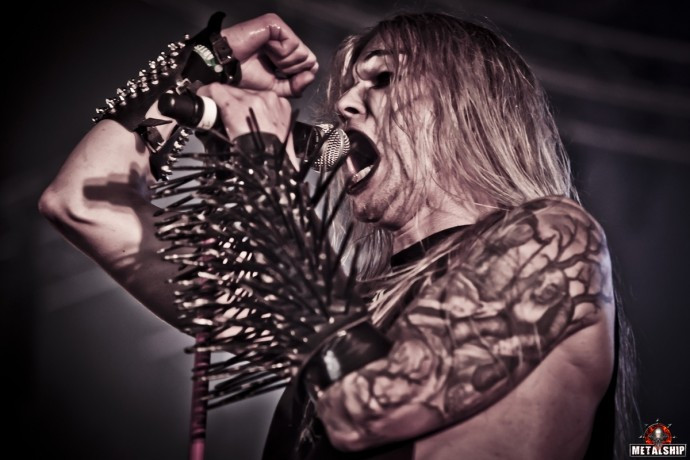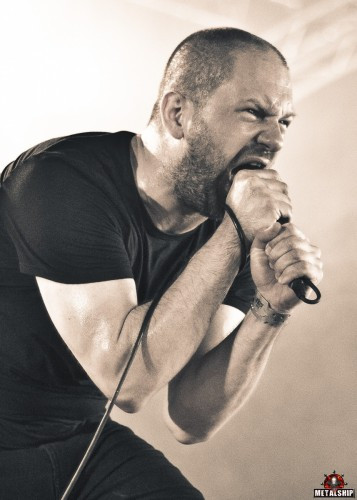Sólstafir — photo by Gediminas Bartuška
(In this post Andy Synn voices his opinion about the most important unifying factor in all great metal.)
Ok, so, hyperbolic title aside, this is an issue I’ve been thinking about for some time.
The question of why.
Why I love the sound and fury of metal. Why I love certain bands and not others. Why I love this genre, over any other. What it is, beneath all the noise and chaos and bloody-minded catharsis, that truly connects with me.
In many ways it’s something instinctive. Or at least it feels that way. Sometimes it seems like there’s no rhyme or reason behind it. Yet it’s also something that seems ripe for analysis and self-reflection. Something that says just as much about me as it does about metal.
So, in pseudo-analytical fashion, I’ve been attempting to identify some sort of underlying factor that contributes to my love of metal as a whole. Something that explains my love of the genre in its varying forms, from the live performance to the recorded art, and something which explains why it stimulates me not only to wax lyrical about the genre here at NCS but also to create lyrically in two bands of my own.
Something vital.
Something fundamental.
And that something is simple.
Passion.
More than anything else passion is what truly unites the bands I love. From Alcest to Arsis, from Heaven Shall Burn to High on Fire, from Satyricon to Sólstafir, passion is the key, passion is the spark. It fuels the desire and stokes the fires of creativity at the heart of the music that inspires me.
It is something shared, yet paradoxically comes in many forms. Maybe not all bands feel the same fiery passion for their lyrics as others, yet the passion for performance, for playing, for creation, for that connection with an audience, all stem from the same underlying source.
Some bands are fuelled by this passion to have long and storied careers. Others burn through it quickly and move on to other arenas where their passion continues to drive them. Some bands constantly reconfigure themselves to maintain their edge, while others choose to step back from the limelight for a time, returning with renewed focus and vigour.
Passion is perhaps the most basic, yet most vital, element to the music I love. Manufactured pop stars and their ilk may have made a business out of faking a connection and providing a simplified, watered-down version of real emotion, but it’s hard to deny the cathartic effect of a truly visceral scream, one that comes right from the heart, right from the soul.
Passion is the reason that a raging death vocal (Misery Index) or a blackened snarl (Kampfar) can convey the same intensity and emotion as a furious hardcore bark (Earth Crisis) or soaring clean vocal (Communic) – or even no vocal at all (Scale The Summit)!
Passion is the reason I can listen to songs in languages I don’t know – “Die Last Der Erinnerung”, “Natt Utover Havet”, “Tróndur Í Gøtu” – and still be captivated by the emotion being expressed and the story being told.
Passion, or the lack thereof, is also at the root of why so many fans fall out of love with certain artists, or never even make that connection in the first place.
Sure it’s great to see Metallica still putting on a big show for their audience, and you know that the band do still appreciate it, but at this point it’s a hobby and a (much loved) job for them. It seems to me that they’re not driven by passion anymore, and while you can definitely say they’ve earned the right to rest easy after their years at the top of the mountain, the cooling of this passion certainly explains why many of their fans, for better or for worse, simply don’t feel that connection to them anymore.
Similarly you can also tell pretty easily when a “mainstream” metal band truly feels passionate about the music, and when they’re in it for the chance money and fame. As popular as they might have become, I don’t doubt that Trivium still feel a genuine love for metal – something made all the more obvious by their continued support of other, more underground acts, as well as their multiple side-projects. I can’t really say the same about some of the other “big” metal acts though.
Passion is, ultimately, the unifying force behind all the bands I love, from the most extreme (Anaal Nathrakh) to the most melodic (Amorphis), manifesting equally in ridiculous bombast (Fleshgod Apocalypse) and beautiful restraint (Junius).
Passion can push bands to stretch their creative boundaries – consider the multiple styles portrayed throughout Devin Townsend’s career, or the organic progression of Enslaved – or it can focus them on a signature sound – look no further than the unwavering stomp of Suffocation or the necrotic blizzard of Horna – which they defend to their dying breath.
It comes in many forms, from pain (Life of Agony) and loss (Swallow The Sun), to malice (Aborted) and misanthropy (Shining). It can drive bands to blasphemy (Marduk) or to belief (Extol), and unites the Christian and the atheist, the pagan and the Satanist, under one banner.
As much as the distorted guitar and the shattering of cymbals, passion is the fundamental foundation of the metal genre. And I wouldn’t have it any other way.





This is something I wonder about as well, and your explanation is solid. I would add honesty. It presents hate, anger, beauty, passion, love, and loss with an open and unflinching eye. It does not hide from that which may be emotionally uncomfortable or considered negative. It does not condescend and talk down to you. It’s the human experience, laid bare. Warts and all, as the saying goes.
1. I don’t know that “passion” is the right word. Plenty of non-metalheads are passionate about their music. I would say “intensity” might be better, or perhaps “extremity,” because metal gravitates toward extremes.
2. I don’t know that you can boil it down quite this simply. About four years ago I attempted to define metal, and I think I did OK.
3. That is the most honest/credible assessment of Metallica at this point in their career that I have seen.
4. I wonder if the non-Christian element of metal will ever fully embrace (or in some cases, even tolerate) the Christian element.
You’d think with a post title like that, there’s be a lot more discussion. What did you DO, Islander?
A brief summary of my own definition of metal, is that metal has to be two things: 1) descended from a previous form of metal (whose family tree begins at Black Sabbath) and 2) it must sound like metal.
A note on passion in other music: I used to believe that passion was almost the exclusive province of the metal community. I gradually came to understand it’s not. A secretary at my old law firm made a comment about the rap she listened to, from artists “you’ve never even heard of.” Underground credibility in hip hop? I had no idea! Then I started to find out about alt-country, which is a thing I had no idea existed. I used to think that everyone who learned how to play guitar did so out of a love for metal or hard rock, and only ended up in other genres to pay the bills. But it turns out that’s not true.
The final straw was when I started noticing my cousin’s Facebook posts about an upcoming Lady Gaga album (this was a few years ago), which had her really, genuinely excited. I thought all pop music fans were casual fans, by definition. But apparently that’s not so. Another cousin–allegedly male and heterosexual–drove quite the distance and got “stoked” (or whatever) about a Ke$ha show.
And finally, as you seem to have recognized, not all metal has passion.
Just to point out that I was not at all claiming that metal had a monopoly on passion, nor was I trying to DEFINE metal. What I was doing was looking into the music I love, the specific bands I love, and trying to find the key factor that underpins all of them, extreme or otherwise. And for me it’s the obvious passion that comes through in their music. That’s what separates the bands I like from the bands I don’t – I just don’t feel the same passion from them.
Got it. So, if I understand you correctly, passion is what separates good music from bad music.
“I” think so, but the older I get the more I’m coming to understand that it’s not necessarily what other people look for in their music. Some people really do just appreciate a good beat and something they can dance to.
Of course you can argue (and I suppose I usually do) that these people don’t appreciate music on the same way/at the same level – and that occurs in metal too in many cases – but IF someone were to look deeper into music, I think passion for it would be a major factor.
I’m with you. I looked at my wife’s iTunes and discovered she almost never finishes a song. They’re only three minutes long! If you can’t listen to it that long, do YOU even like it? I think not. But I’m as biased as you. The reality is we have s very different definition of “good” music. Hey, some people like the Transformers films, you know?
Given your definition of metal, would you classify djent as metal? the undertones are definitely present but I feel they’re so far removed from the roots that one could make the argument that it’s a genre of its own?
Yes, I think so, but it is an interesting question.
See, I personally have no problem calling it a form of metal. I don’t see why people would think otherwise.
However… that doesn’t mean you have to like it. I don’t like all forms of metal (though I appreciate most).
For me the issue with djent is that I rarely FEEL that passion from it. It’s very cool and formulaic to me. It’s about putting together a very specific sound, with very tight limitations, that’s all simply about the execution and the perfection. Even vocally. It just feels very box-ticky, to me.
Heck, people often throw the accusation at Tech-Death that it’s “soulless” and without passion, and while I agree that there certainly are bands like that, I still think many of them display that passion in the intensity and complexity of their playing. When I can FEEL a band pushing themselves, sweating and bleeding over a difficult riff, that still seems to be an expression of passion to me.
And it’s something I largely don’t feel with djent.
I agree with FMA about “passion” and that musicians and fans involved with other genres can possess just as much of it as metalheads. Although I have a hard time seeing how anyone could be stoked about Kesha based on purely musical grounds. Maybe something about the stage show was really exciting?
For me, on one hand I love metal for the complexity, musicianship and the freedom to go “outside the box”. When you’re willing to explore extremes it also opens up all the territory in the middle, meaning nothing is really off limits. On the other hand, there’s just something on a primal level that I love about riffs, distorted electric guitar and dark sounding music; I can’t really explain why I enjoy those things.
i definitely agree that there’s a great deal of passion in metal. i’m not sure if that would have been my answer to the question of “why” i love it or if that particular quality is exclusive to metal.
but i would have a pretty hard time explaining why it is i’m addicted to this form of music.
i know that when i hear other forms of music i tend to not really feel anything, other than possibly a headache coming on. i do actually get kind of grumpy and irritable when i have to listen to styles of music i’m not into, like r&b or country. or dance and techno. or folk music. or bluegrass. hmmm.
but when i’m at a metal show i’m in bliss. i love the music, the fans, the merch, the smell of pot and spilled beer and cigarettes. every single thing about the metal experience puts a huge smile on my face. and the louder, faster, more aggressive it is, the better. and when i’m in the middle of a crowd of thousands of metal freaks who are banging their heads and throwing up the devil horns i feel like that is exactly where i was born to be.
that’s probably the closest i can come to explaining why i love metal.